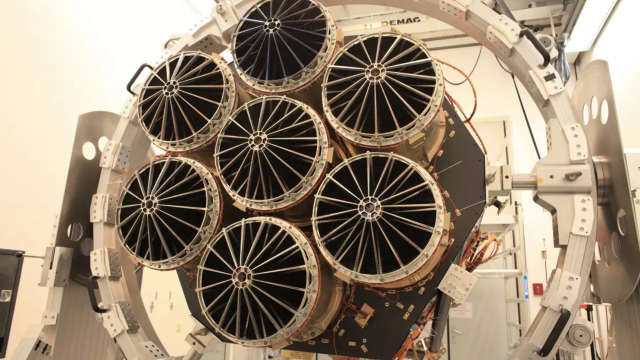Russia’s space agency has announced its intention to unilaterally seize control of a German telescope mounted to a Russian-built spacecraft. It’s a terrible, irresponsible idea, as even Russian scientists will admit.
The German developer of the eROSITA telescope, the Max Planck Institute, put the instrument into sleep mode this past February in protest of Russia’s unwarranted and ongoing invasion of Ukraine. The X-ray telescope is the primary instrument aboard the joint Russian-German Spektr-RG mission, which the Russian space agency Roscosmos launched to space in July 2019. The Russian ART-XC X-ray telescope is also attached to the spacecraft, and it works in tandem with eROSITA.
It now appears, however, that Russia is going to switch eROSITA back on without the explicit consent of the Max Planck Institute, as reported in Deutsche Welle. Roscosmos chief Dmitry Rogozin, a devout supporter of Putin and the Russian invasion of Ukraine, made his intentions clear during a recent televised interview.
“I gave instructions to start work on restoring the operation of the German telescope in the Spektr-RG system so it works together with the Russian telescope,” Rogozin said. “Despite Germany’s demand to shut down one of the two telescopes at Spektr-RG, Russian specialists insist on continuing its work. Roscosmos will make relevant decisions in the near future.”
To which he added: “They — the people that made the decision to shut down the telescope — don’t have a moral right to halt this research for humankind just because their pro-fascist views are close to our enemies.”
Spektr-RG is currently in a halo orbit some 1.5 million kilometres from Earth. The science phase of the collaborative 7.5-year mission began in October 2019. The eROSITA telescope is in the midst of an all-sky survey, in which it’s scanning the universe in the medium X-ray range “with an unprecedented spectral and angular resolution,” according to the Max Planck Institute for Extraterrestrial Physics. The device consists of seven identical mirror modules, each of which contains 54 nested mirror shells that allow for the telescope’s high sensitivity.
Scientists with the eROSITA project are using the telescope to map out the large-scale structure of the universe, to detect obscured black holes in nearby galaxies, and to study the physics of X-ray sources, such as young stars, supernova remnants, and X-ray binaries.
Lev Zeleny, scientific director of the Space Research Institute of the Russian Academy of Science, spoke out against the decision to switch eROSITA back on, saying: “Our institute — all scientists — strongly object to this proposal,” as he was quoted by Russia’s state-run Gazeta. The objection, Zeleny said, “is both for political and technical reasons,” saying it’s not clear if Russian astronomers will actually figure out how to use eROSITA, or if outside journals will go on to publish any scientific results that might come from the move.
The scientific supervisor of the Spektr-RG project, Rashid Sunyaev, is concerned that Russian astronomers might accidentally damage Germany’s telescope, as reported in Interfax, a private Russian media outlet. “This is a wonderful device, absolutely world class, which has already given a lot of data,” Sunyaev said. “We all dream of seeing it return to active work. But it is an amazingly complex device, and if we decide to ignore agreements with partners and turn it on ourselves, it can simply ruin it,” Sunyaev said.
Russia’s war in Ukraine has been damaging on so many levels, the science realm included. It will likely take years, if not decades, for these broken relationships to mend. Rogozin’s decision to space-jack a telescope would only make a bad situation worse. He’d best think twice.
More: NASA Astronaut Scott Kelly to Russia: ‘Your Space Program Won’t Be Worth a Damn’.
